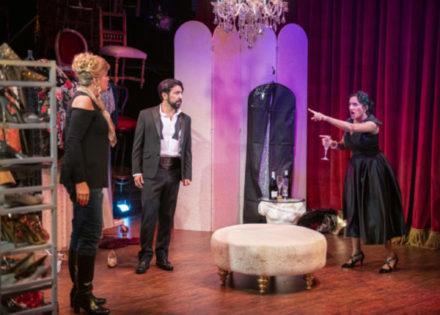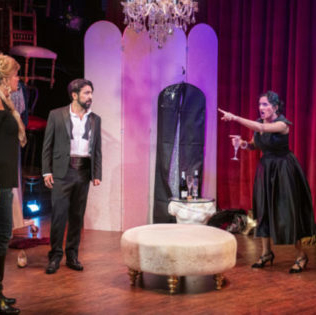In the current issue of The New Yorker, music critic Alex Ross writes about the multiple ways orchestras have found to reimagine their 2020-2021 seasons (“What Does It Mean to ‘Reimagine’ an Orchestra Season?”; online Nov. 30; print issue Dec 7). Performances have ranged from outdoor chamber concerts, to streamed concerts of live music played by a reduced number of musicians, to the NY Phil Bandwagon, which during warmer weather presented more than eighty concerts in various sites throughout New York’s five boroughs. Ross’s emphasis is on orchestras, although he does mention an intriguing drive-through “Götterdämmerung” which Michigan Opera Theatre presented in Detroit in October.
Orchestras have been able to reimagine some kind of 2020-2021 season, but opera companies have not. The logistics of assembling soloists, chorus, and orchestra in an enclosed space to produce live opera are insurmountable during a pandemic when singing is known to carry an elevated risk of transmitting COVID-19. Many opera companies have resorted to streaming previous productions. So the launch of Opera San José’s first fully-staged digital opera production in the midst of the pandemic is particularly exciting.
When the pandemic shut down live performance earlier this year, Opera San José general director Khori Dastoor decided the company needed to take some creative risks to remain viable. Using part of their facilities, she created a state-of-the-art digital studio that has been showcasing resident artists in streamed performances, presenting master classes, in-conversation events and more. It was the perfect venue in which to create a new digital production of a chamber opera, and Dastoor’s first choice was Three Decembers by composer Jake Heggie and librettist Gene Scheer.

Photo Credit: Ellen Appel
The opera has been called “a modern masterpiece” by Opera Today, and the San Francisco Chronicle has described this digital production as “elegant,” and “a dexterous how-to for artistic operating within the age of COVID.” The 90-minute chamber opera is based on Tony Award winning playwright Terrence McNally’s unpublished play Some Christmas Letters and has particular poignancy right now since McNally died of complications from COVID-19 last spring.
The opera spans three Christmases (1986, 1996, 2006) and centers on the troubled relationship between an aging showbiz diva and her two adult children as each struggles with his/her own identity and relationships within the family as long-buried family secrets come to light. The original production was premiered by the Houston Grand Opera in 2008 and featured Frederica von Stade in the role of Madeline, the aging diva. Since that time, it has been produced more than 30 times, but this digital production is a first.

The incomparable mezzo-soprano Susan Graham leads the cast and is joined by Resident Artists soprano Maya Kherabi, baritone Efraín Solís, conductor Christopher James Ray, and director Tara Branham. The original orchestral ensemble of 11 instrumentalists was cut down to 2 pianists because, due to pandemic restrictions, the facility was allowed to hold only 12 people.
Producing an opera in the middle of a pandemic, even with no audience, is a monumental task. The cast was willing to go to great personal lengths to be able to participate in this production. They quarantined for two weeks prior to rehearsals and then lived together as a family or pod throughout rehearsal and filming. Everyone was tested frequently several times a week, temperatures taken every day, and everyone was aware that if one person became ill with the virus, the entire production would shut down. The conductor and the two pianists were all behind plexiglass screens. The crew wore personal protective equipment, the filming area in the Fred Heiman Digital Media Studio was disinfected every day, and there was even a dedicated safety officer (who did double duty as a dresser) to ensure that safety protocols were followed.
In a documentary on the company’s website about The Making of Three Decembers (scroll down to find the documentary), the singers, conductor and director all speak to the personal importance for them of being able to do meaningful work during a pandemic. The quarantining and living in a pod, wearing masks, conducting behind plexiglass, and rigid safety protocols seemed to them to be a small trade-off for the opportunity to do what they love – to be able to make music and be involved in the production of an opera. After wondering earlier during the pandemic how long it would be before they would ever be able to be a part of an opera again, this cast and crew seems to have considered the opportunity to participate in this digital production a gift – and it’s certainly a gift to us as well.
The digital production of Three Decembers is available via on-demand streaming from December 3 through December 31.
